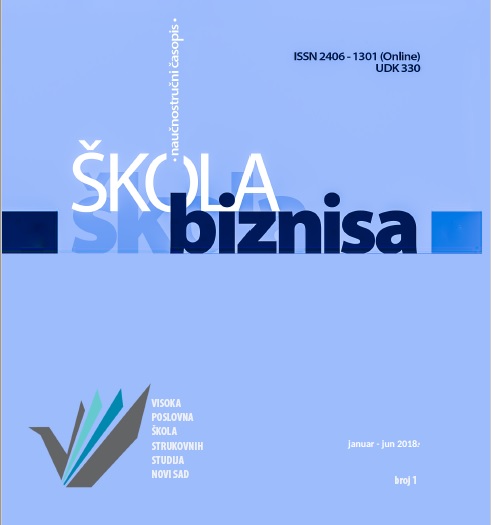AN ALYSIS OF MOBILE PHONE SERVICES QUALITY ELEMENTS IN THE REPUBLIC OF SERBIA
Abstract
In modern business conditions, characterized by vast turbulences, uncertainty and dynamics and the survival, growth and development of companies is conditioned by focusing on ensuring a high level of service quality. It is considered that a company cannot achieve success in today’s business environment if it fails to provide services of superior quality. The ever-growing competition among mobile service operators imposes the need to identify key service quality elements. In order to remain competitive, communication service operators should provide services in accordance with the needs and stances of their users. The main objective of this research is to identify i.e. isolate the underlying factors that determine the quality of mobile phone services in the Rebublic of Serbia and determining their impact on customer satisfaction.
References
Bojković, N., & Petrović, LJ. (2010). Ocena kvaliteta komunikacionih usluga primenom indeksa zadovoljstva korisnika. U: Simpozijum o novim tehnologijama u poštanskom i telekomunikacionom saobraćaju – PosTel 2010. (185-192). Beograd.
Chen, C. F., & Cheng, L. T. (2012). A study on mobile phone service loyalty in Taiwan. Total Quality Management & Business Excellence, 23(7-8), 807-819.
Clemes, M.D., Shu, X., & Gan, C. (2013). Mobile communications: a comprehensive hierarchical modelling approach. Asia Pacific Journal of Marketing and Logistics, 26(1),114-146.
Drinić, D., Vranješ, M., & Gašević, D. (2014). Koncept lojalnosti potrošača u maloprodaji. Škola biznisa, 2/2014, 91-106.
Garvin, D. (1984). What does ‘product quality’ really mean? Sloan Management Review, 26(1), 25-43.
Gašević, D., Vranješ, M., & Drinić, D. (2016). Identification of Key Determinants of Satisfaction of Users of Electronic Banking Services. Economic Themes, 54(2), 301-321.
Grubor, A. (2011). Očekivanja, satisfakcija i lojalnost potrošača u marketingu usluga. Anali Ekonomskog fakulteta u Subotici, 47(26), 23-32.
Gustafsson, A., Johnson, M.D., & Roos, I. (2005). The Effects of Customer Satisfaction, Relationship Commitment Dimensions, and Triggers on Customer Retention. Journal of Marketing, 69(4), 210-218.
Kheng, L.L., Mahamad, O., Ramayah, T., & Mosahab, R. (2010). The Impact of Service Quality on Customer Loyalty: A Study of Banks in Penang, Malaysia. International Journal of Marketing Studies, 2(2), 57-66.
Kim, M.K., Park, M.C., & Jeong, D.H. (2004). The effects of customer satisfaction and switching barrier on customer loyalty in Korean mobile telecommunication services. Telecommunication Policy, 28(2), 145-159.
Negi, R.. (2009). User's perceived service quality of mobile communications: experience from Ethiopia. International Journal of Quality & Reliability Management, 26(7), 699-711.
Oliver, R. L. (1993). Cognitive, Affective and Attribute Bases of the Satisfaction Response. Journal of Consumer Research, 20(3), 418-430.
Osman, Z., & Sentosa, I. (2013). Mediating Effect of Customer Satisfaction on Service Quality and Customer Loyalty Relationship in Malaysian Rural Tourism, International Journal of Economics Business and Management Studies, 2(1), 25-37.
Quach, T.N., Thaichon, P., & Jabarajakirthy, C. (2016). Internet service providers' service quality and its effect on customer loyalty of different usage patterns. Journal of Retailing and Consumer Services, 29, 104-113.
Santouridis, I., & Trivellas, P. (2010). Investigating the impact of service quality and customer satisfaction on customer loyalty in mobile telephony in Greece. The TQM Journal, 22(3), 330-343.
Thu N. Q. , Charles J., & Park T. (2016). The effects of service quality on internet service provider customers’ behaviour, Asia Pacific Journal of Marketingand Logistics, 28(3), 435-463.
Turkson, E. D. (2012). Quality Assurance in the Hospitality Industry: A Case Study of Capital View Hotel, Koforidua. Master’s Thesis, Kwame Nkrumah University of Science and Technology, Institute of Distance Learning, 1-87.
Zeithaml, V.A., Parasuraman, A., & Berry, L. L.(1990). Delivering Quality Service: Balancing Customer Perceptions and Expectations. New York: The Free Press.
- Authors retain copyright and grant the journal right of first publication with the work simultaneously licensed under a Creative Commons Attribution License that allows others to share the work with an acknowledgement of the work's authorship and initial publication in this journal.
- Authors are able to enter into separate, additional contractual arrangements for the non-exclusive distribution of the journal's published version of the work (e.g., post it to an institutional repository or publish it in a book), with an acknowledgement of its initial publication in this journal.
- Authors are permitted and encouraged to post their work online (e.g., in institutional repositories or on their website) prior to and during the submission process, as it can lead to productive exchanges, as well as earlier and greater citation of published work (See The Effect of Open Access).

